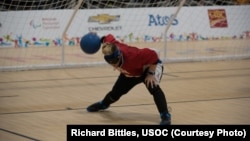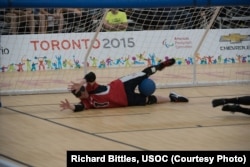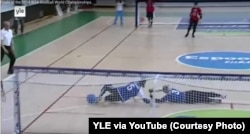Fresh off the Olympic Games, Brazil now hosts the Paralympic Games. Well over 4,000 athletes from more than 160 countries will travel to Rio to compete in sports that are familiar, such as judo and power-lifting; adapted, like wheelchair rugby and sitting volleyball; and not so well-known, like goalball.
Dodgeball + soccer + softball = new sport
Goalball was invented in Europe right after World War II to help blinded veterans stay active. It's now played worldwide. It became a medal event at the Paralympic Games in 1976.
The three players on each goalball team position themselves in front of their net, which stretches across the back line of the volleyball-sized court. One player takes the 1.5 kilo medicine ball and rockets it, low, across the court. The bells inside the ball jingle, so the defenders can hear it coming at them. They crouch, reach, slide or lunge to keep it from their net.
Seven-time U.S. Paralympian Jen Armbruster compares goalball to several other sports. "Your defense is very much (like) a soccer goalie. You're defending and using your body to defend it. The underhand motion is like a softball pitcher. It's underhand or sidearm because it has to be low." She says it's most like dodge ball, but in reverse , and with a heavier, faster ball. In dodge ball, the object is to avoid the thrown ball. In goalball, the defending team puts their bodies in the way of the ball.
The court is marked off with tactile lines made with masking tape over string so players can feel where they are. Because the players have varying levels of sight, they all wear blackout eye masks so everyone is equally blind during the game. If a ball goes out of bounds, sighted officials at courtside put it back inside the line where a player can get it.
A team experience
Armbruster, 41, transitioned to goalball from basketball in her teens when optic nerve degeneration gradually took her eyesight. She says she loves team sports and "the team experience."
"Being part of a team is usually what draws a lot of people in, that feeling of I do belong here. This is a sport that I can play. And I can play with my sighted friends because, guess what? I can slap a blindfold on them and take them out here."
Eliana Mason, who was born with cataracts and glaucoma, giving her blurry vision, also loves the competitive aspects of the game. "I just fell in love" with goalball, she says of the sport she first played at a sports camp for visually impaired kids during high school. "We play it so much you have dreams about playing the sport. After a training camp I'll wake up with my hands in the air trying to block a ball in my sleep."
But the Portland State University senior admits she wasn't into goalball at first. "My first practice they just kind of hammered me with balls. Afterwards, I looked at my dad and I was like, 'I don't know if I really like this.'" But she's glad she gave it another try, eventually earning a spot on the 2016 U.S. women's team.
Flying down to Rio
The atmosphere during a goalball match is in stark contrast to other international competitions, where the crowds loudly cheer their country's team. Spectators have to be quiet, so the players can hear the ball. That might make things interesting in Brazil, where the fans have a boisterous reputation. The troubled economy in the host city and country has forced budget cutbacks and consolidation of Paralympic Games venues, but all planned sports will still be contested.
Five-time Paralympian Asya Miller, 36, says she followed the Olympic Games in Rio to get a sense of what she is in for. "I'm not expecting to go down there to stay in a 5-star resort. I know that. I'm going there down there to play. I'll deal with whatever is thrown at me while I'm there but I'm really going down there to play."
The U.S. women enter the Rio Paralympics as the defending world champions in goalball. They may be tested by Canada, Turkey, China and Japan, which won gold in London in 2012. Their first game is against host country Brazil on September 8.







